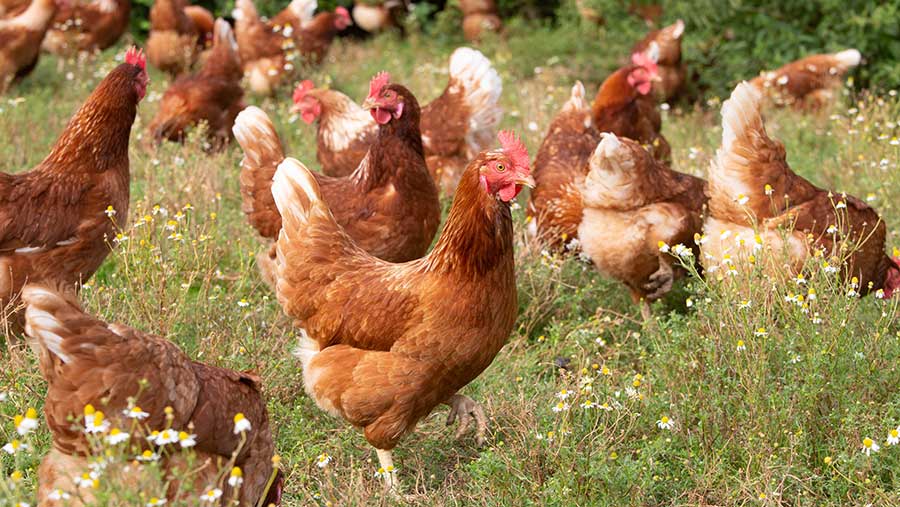Defra figures show organic land conversion is on the rise
 Organic poultry numbers rose from 3.79m birds in 2020 to 4.02m in 2021 © Tim Scrivener
Organic poultry numbers rose from 3.79m birds in 2020 to 4.02m in 2021 © Tim Scrivener The amount of UK farmland in conversion to organic saw a healthy rise in 2021 compared with the previous year, new Defra figures show.
The area of farmland going through the two-year conversion period stood at 42,000ha in 2021 compared with 31,300ha in 2020.
See also: Expert’s 5 tips for arable farmers converting to organic
Defra’s annual statistics show that just over 506,000ha is farmed organically in the UK, representing 2.9% of the country’s total farmed area.
This accounts for both the fully converted area and area under conversion, and is up on the 2020 figure of 489,000ha.
Sophie Kirk, business development manager for the Soil Association, said a growing number of farmers were converting to organic as nature-friendly farming appealed to consumers and offered resilience for their businesses.
“Our farming sector has dealt with many shocks over the past few years, but opportunities for sustainable farming remain strong with rising consumer demand and government support for organic,” she said.
“It is clear both government and shoppers are waking up to the benefits organic can deliver for nature and the environment, and these latest figures show that, with the right incentives, nature- and climate-friendly farming can grow rapidly.”
Other UK organic land use figures
- Area of organic vegetables up from 8,700ha in 2020 to 8,900ha in 2021
- Area of organic cereals up from 39,000ha in 2020 to 43,200ha in 2021
- Organic poultry numbers rose from 3.79m birds in 2020 to 4.02m in 2021
- The South West continues to have largest percentage of agricultural land in organic, at 8.5%
The Soil Association predicted that the rise in organic farming would continue in 2022, after the government announced it would pay up to double the previous rates to farmers in England who convert to organic.
Organic conversion
Arable farmer Alex Fraser and his brother Rob completed the conversion to organic on their 105ha farm in West Yorkshire in summer 2021.
They are growing spring beans and spring wheat in an intercropping system, and apply the same approach to oats and vetch, as well as barley and oats.
Alex Fraser said: “We took our family farm back in hand three years ago when the previous tenancy came to an end, and straight away decided to put it into organic conversion.
“It has been a massive learning curve for us, but when faced with issues such as climate change, biodiversity losses and the burden of chronic health conditions, it was the perfect time to build a sustainable farming system from scratch.
“We couldn’t really imagine farming in any other way; it just felt like the right thing to do.”
Mr Fraser said organic seemed the most viable option financially, given the soaring costs of inputs.
